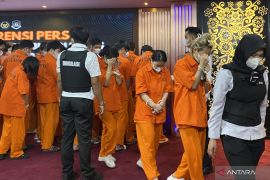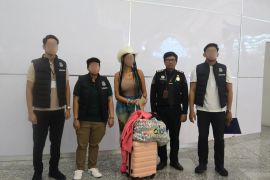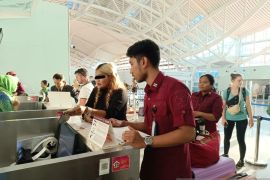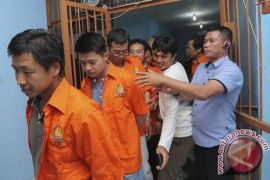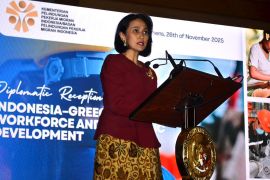"I ran away from my employer`s house and did not carry my passport. I only carried an iqama card (Saudi Arabia`s employment contract identity card)," Dina added.Her relieved smile suddenly colored her face, when one of the Indonesian Consulate General officers for Jeddah called out her name at the Saudi Arabia immigration detention complex "Tarhil", after she waited there for over a month.
She could not hold her tears when her name was called out from among the dozens of other Indonesian women who have been waiting under the blazing hot Sun, looking forward to return to their homeland.
The officer, who called out the names, handed over her travel document, replacement for her passport (SPLP), as ticket to get out of the immigration detention centers.
The passport replacement travel document is her "golden ticket" to take her home, leaving behind bitter memories as a domestic worker in Saudi Arabia.
Once she grabbed her travel document, the officer asked her to pack her belongings that were still in the detention "amber, an immigration detention hall with a capacity of 72 people with 36 bunk beds.
As she rushed off into the amber to pack up, tears were still streaming down her cheeks.
Dina Eka Safitri, born in 1989 in Sumbawa, West Nusa Tenggara, was forced to try her luck in Medina, Saudi Arabia, two years ago, to work as house maid.
Dina managed to leave for Medina through a legally authorized manpower agent in Indonesia.
Initially, her job was fine; however, five months later, her employer stopped paying her regularly as was done in the previous months.
At first Dina was reluctant to claim her rights from the employer. However, after two months of not receiving her salary, and with her sister waiting for regular money transfer from her, for her (Dina�s) four year old son back home, she began to ask her employer for her dues.
"Babah (Arabic term for father), may I ask for money for my salary? I need it to send to my son at home in Indonesia," Dina narrated, as she recounted her experiences in Saudi, at the immigration detention centers Tarhil, Shumaysi, which is located between Jeddah and Mecca, in the kingdom of Saudi Arabia.
Dina claimed that the employer would always simply say, "Yes later, I have not yet take money from the ATM," and so on.
Even seven months later, the situation did not getting any better and the answers were almost always similar.
Besides the fact that the employer failed to pay Dinas dues, she also had to face abuses from the employers son, who often sexually harassed her.
"If my employer was not home, his son would often flirt with me, though I would always turn it down," said Dina.
After such repeated experiences, Dina could take it no more and decided to escape to Jeddah.
When Dina left her employers house, she had to do so without her passport since it was held by the employer. This made her one of the illegal foreign workers in Saudi Arabia.
"I ran away from my employers house and did not carry my passport. I only carried an iqama card (Saudi Arabias employment contract identity card)," Dina added.
Dinas legal permit to work in Saudi Arabia ceased to exist, the minute she ran away holding just the "Iqama" from the employer without the passport.
After her successful escape, Dina spent her time in Jeddah where she found a new employer who was willing to hire her. This time she was treated well, and was also paid regularly.
Although she was treated well and was paid a regular salary, the bitter memories of her early working days in Saudi continued to haunt her. She then began to look for ways to return to Indonesia.
Soon after that, the Saudi Arabian Kingdom government announced an amnesty for foreign workers to renew their status, either through an Iqama renewal to continue working in the country, or through replacement travel documents like a passport, to return to their home country.
Foreign workers who are required to renew the official documents are those who abuse their visa allotments, those who overstay or those who are officially undocumented.
As she was aware that she was one of the overstayers, Dina decided to propose for her passport replacement to the Indonesian Consulate General as representative of the government of Indonesia in Jeddah, Saudi Arabia.
The process was however, not easy, considering that her passport was still being held by her previous employer and she carried an Iqama card, with an expired date that needed to be renewed every year.
Iqama is an identity card that indicates a working relationship with the employer. In Dinas case, she was working with another employer, and thus, the Iqama could not be renewed at the immigration office of Saudi Arabia, Jawazad.
The amnesty period provided by the government of Saudi Arabia, was not enough for Dina to take care of all the required documents in order to return to Indonesia, because she had to struggle alongside 1.2 million other fellow Indonesian workers!
The amnesty period for foreign workers in Saudi Arabia ended on November 3, and Dina was still an "illegal" resident.
With her illegal status, Dina knew little about her where she should go and decided to follow others who had gathered in the parking lot of a former Jeddah airport, Mator Qodim.
Dina and her fellow countrymen were captured by the local police and handed over to the immigration officer who then placed them in a detention center in "Tarhil," where they had to wait for the deportation administration process to be completed.
Tarhil, the immigration detention center, is located between the Jeddah-Mecca express way, with an area of about 2 hectares, surrounded by 6 meters high concrete walls and surveillance cameras on all sides.
Tarhil has 27 blocks consisting of 75 "Amber" (dorms) measuring approximately 10X18 feet, with 36 bunk beds for 72 people, and is equipped with eight bathrooms and two rooms each for sunbathing and dining room.
The dorm is also air conditioned and the residents are provided with three meals a day.
With a large number of Indonesians placed in Tarhil, the Indonesian government representatives constantly monitor and seek to speed up the deportation process.
Given that the placement of foreign nationals in Tarhil is the authority of the Kingdom of Saudi Arabia and its affiliated agencies, the Consulate General in Jeddah could only monitor the state of its citizens.
However, unlike other government representatives from countries such as the Philippines, Ethiopia, Yemen, Nepal, Thailand and Pakistan, Indonesia has always monitored its citizens by constantly having three officers in 24 hour shifts.
"We constantly monitor the overstayers� state so as to meet their needs. They are still able to eat and sleep on mattresses in rooms that are equipped with air conditioning," pointed out Consul General to Jeddah, Dharmakitry Syailendra Putra.
According to Dharma, all deportation process is entirely the authority of the royal government of Saudi Arabia, and the Consulate General can only monitor the process and provide support to expedite the repatriation of overstayed Indonesian Workers which reached about 11,200 people.
"Initially, we were targeting to send all overstayers within eight days with twice-daily flights provided by the government of Saudi Arabia, but there are several administrative errors that make the process much longer," explained Dharma.
However, the number reduced gradually by mid-December 2013 to be about 1,900 people who are still remaining in Tarhil, and will soon be discharged, Dharma assured.
EDITED BY INE
(T.A050/A/KR-BSR/O001) 23-12-2013 12:26:26
Reporter: By Ageng Wibowo
Editor: Fardah Assegaf
Copyright © ANTARA 2013


